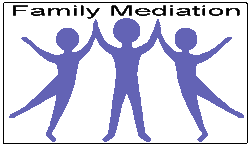
As we approach the holidays there is greater stress on families and fuses can be short. Coupled with the economic downturn, families are having difficulty coping with life. This is the perfect time to provide some insight into the mediation process.
First, it is important to understand how a person becomes a mediator, or is qualified to assist in the dispute resolution process. Volunteer mediators come from all walks of life, but many come from the helping professions. Teachers, nurses, and mental health professionals often use mediation as an adjunct to their professional careers and many become family mediators. They all go through an extensive training program, which in many states is an 80 hour or more course. The process of mediation is learned with lecture and role playing to structure a framework that provides consistent, and repeatable dispute resolution outcomes. There is an internship with other established mediators, and then, certification.
The scope of problems encountered by mediators is indeed wide and varied. It can be a son or daughter who is often truant, belligerent, of failing to be a participating member of the family. Or there can be drug or drinking problems and just bad behavior. Or, it can be a husband and wife that are just not communicating and having difficulty with their marriage. Mediation is simply dispute resolution within a family.
The entire process of family mediation is confidential and is not based on the ability to pay. The family starts with an intake interview to establish whether or not mediation is the correct course of action. They are then assigned either a single mediator, or in some cases, co-mediators. In a series of meetings which are somewhat informal but structured, the family outlines the problems and the mediators listen. It is important to understand that the resolutions reached are from the family, and not the mediator. The mediator is a guide or facilitator, and helps to control the negotiation process. The meetings can be with the entire family, individual members, or some combination of the family members. All mediation is based on mutual respect, equality of power, and transparency. The objective is to reach an agreement that all participants believe to be the best resolution, and to work toward complete resolution of the concerns.
This post is simply an overview and is based on over two hundred family mediation's that I have been involved with. The results have been gratifying and it is important to remember that mediators are volunteers. Their reward is successfully assisting a family in distress. And now for the trend that I see in the future. In many volunteer services we have seen a decline in those people willing to give a significant amount of time to community service. The reasons are many and varied, but the trend is real. Small towns and cities have limited budgets to provide essential services and family mediation may be harder to finance. I hope that we can find a way to continue this important part of family intervention.
I wanted to provide a link to finding service in all areas but there is no central directory. But there are State directories. And a call to your town or city hall can provide the location of a mediation center. If you want to be a mediator, make the call to find out about training. It feels really good to help someone else...

 RSS Feed
RSS Feed
